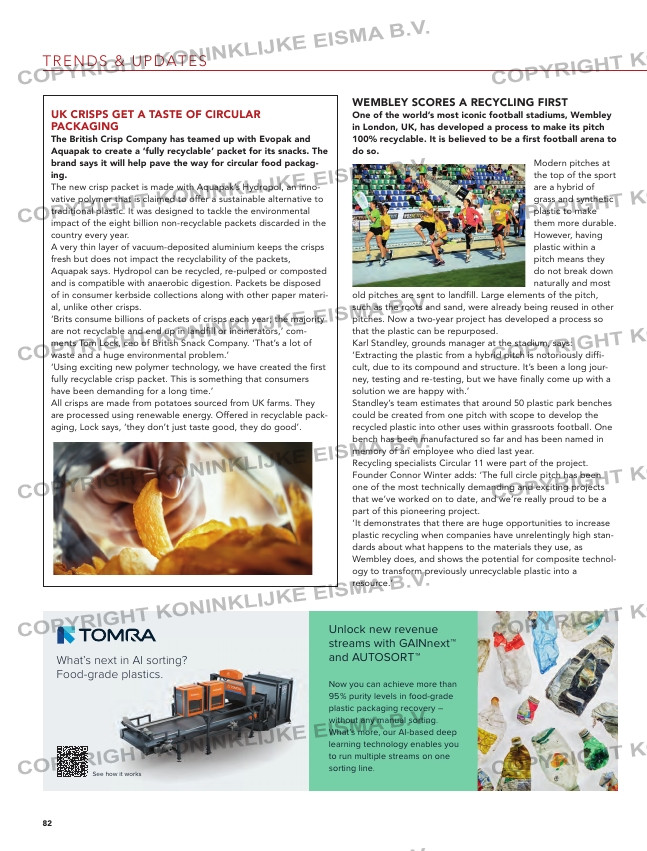Page 82 from: What’s inside?

TRENDS & UPDATES
82
UK CRISPS GET A TASTE OF CIRCULAR
PACKAGING
The British Crisp Company has teamed up with Evopak and
Aquapak to create a ‘fully recyclable’ packet for its snacks. The
brand says it will help pave the way for circular food packag-
ing.
The new crisp packet is made with Aquapak’s Hydropol, an inno-
vative polymer that is claimed to offer a sustainable alternative to
traditional plastic. It was designed to tackle the environmental
impact of the eight billion non-recyclable packets discarded in the
country every year.
A very thin layer of vacuum-deposited aluminium keeps the crisps
fresh but does not impact the recyclability of the packets,
Aquapak says. Hydropol can be recycled, re-pulped or composted
and is compatible with anaerobic digestion. Packets be disposed
of in consumer kerbside collections along with other paper materi-
al, unlike other crisps.
‘Brits consume billions of packets of crisps each year; the majority
are not recyclable and end up in landfill or incinerators,’ com-
ments Tom Lock, ceo of British Snack Company. ‘That’s a lot of
waste and a huge environmental problem.’
‘Using exciting new polymer technology, we have created the first
fully recyclable crisp packet. This is something that consumers
have been demanding for a long time.’
All crisps are made from potatoes sourced from UK farms. They
are processed using renewable energy. Offered in recyclable pack-
aging, Lock says, ‘they don’t just taste good, they do good’.
Unlock new revenue
streams with GAINnext™
and AUTOSORT™
Now you can achieve more than
95% purity levels in food-grade
plastic packaging recovery –
without any manual sorting.
What’s more, our AI-based deep
learning technology enables you
to run multiple streams on one
sorting line.
What’s next in AI sorting?
Food-grade plastics.
See how it works
INT2419_Recycling International_Food packaging_205x64mm_v1.indd 1 26.03.24 09:44
WEMBLEY SCORES A RECYCLING FIRST
One of the world’s most iconic football stadiums, Wembley
in London, UK, has developed a process to make its pitch
100% recyclable. It is believed to be a first football arena to
do so.
Modern pitches at
the top of the sport
are a hybrid of
grass and synthetic
plastic to make
them more durable.
However, having
plastic within a
pitch means they
do not break down
naturally and most
old pitches are sent to landfill. Large elements of the pitch,
such as the roots and sand, were already being reused in other
pitches. Now a two-year project has developed a process so
that the plastic can be repurposed.
Karl Standley, grounds manager at the stadium, says:
‘Extracting the plastic from a hybrid pitch is notoriously diffi-
cult, due to its compound and structure. It’s been a long jour-
ney, testing and re-testing, but we have finally come up with a
solution we are happy with.’
Standley’s team estimates that around 50 plastic park benches
could be created from one pitch with scope to develop the
recycled plastic into other uses within grassroots football. One
bench has been manufactured so far and has been named in
memory of an employee who died last year.
Recycling specialists Circular 11 were part of the project.
Founder Connor Winter adds: ‘The full circle pitch has been
one of the most technically demanding and exciting projects
that we’ve worked on to date, and we’re really proud to be a
part of this pioneering project.
‘It demonstrates that there are huge opportunities to increase
plastic recycling when companies have unrelentingly high stan-
dards about what happens to the materials they use, as
Wembley does, and shows the potential for composite technol-
ogy to transform previously unrecyclable plastic into a
resource.’
78-79-80-81-82_trendsupdatesii.indd 82 25-04-2024 09:33



